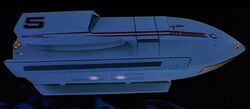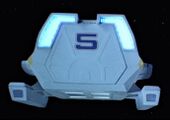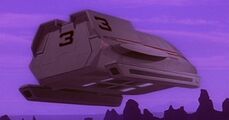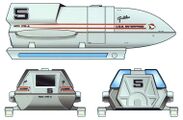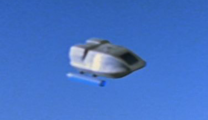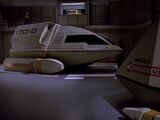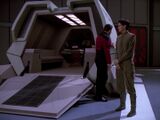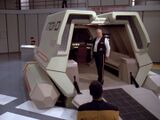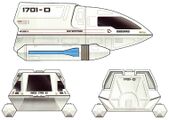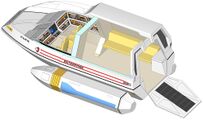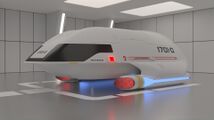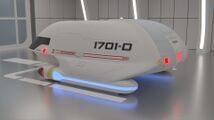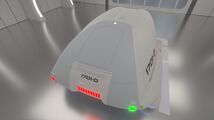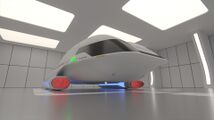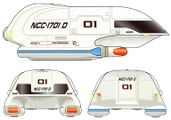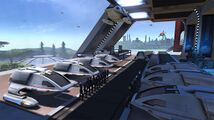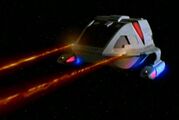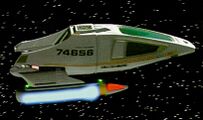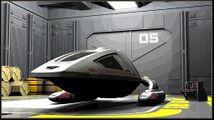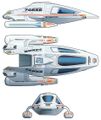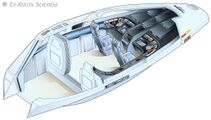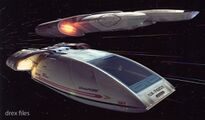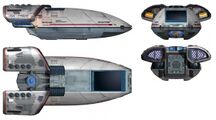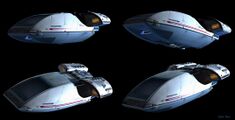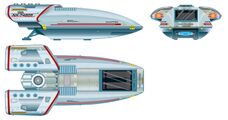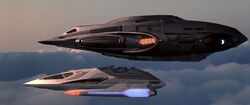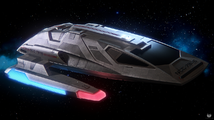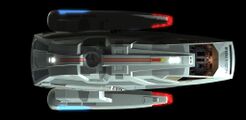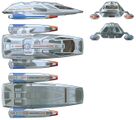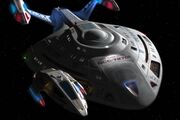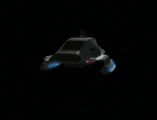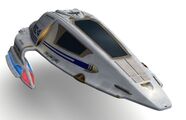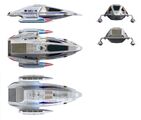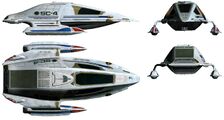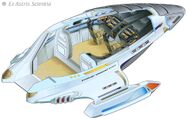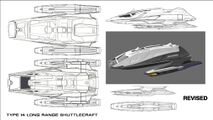Personnel Shuttles
More actions
Personnel Shuttles are the most common form of auxiliary craft used by Starfleet. Made for short-duration missions, these craft generally have warp capability that limits them to an effective range of only a few light-years from their mothership or base, and they typically can accommodate between four and eight people, including their crew. They are most effective at travel within the same star system. While the distinction between personnel shuttles and shuttlepods has shifted over time and can be somewhat fuzzy, personnel shuttles are generally larger and warp-capable while shuttlepods are smaller and limited to impulse speeds.
Type-4 Shuttle
The Type-4 Shuttle is based on the earlier Class-C shuttlecraft, a design that is also still seen in widespread use across the Federation. Its basic spaceframe has served as the core of the later Type-5, Type-6, and Type-8 designs, a line of vehicles that has seen production in the hundreds of thousands since it was first introduced in the 2280s. Generally speaking, these are no longer used by Starfleet, though there are exceptions hanging on at remote outposts and assigned to vessels in the Starfleet Auxilary, such as freighters and tankers. They still see widespread use in civilian hands.
The forward cockpit with two crew stations is separated from the aft passenger area by a section with doors to port and starboard that allow entry to the cabin. Entry is also possible through a large hatch on the aft end of the vehicle. Generally, the aft area contains bench seats on either side, though there are variants with these stripped out to carry more cargo, variants with chairs, and even VIP variants; because of this vehicle's extreme age, there are many variants that could be encountered.
Type-5 Shuttle
The Type-5 shuttle is an evolution of the earlier Type-4 design with an enhanced cockpit and other improvements to the general characteristics of the craft. It has been in service for over sixty years at this point and is generally found on older vessels and on unimportant space stations. It's often used as a flight trainer, given its commonality with so many other small Federation vehicles.
The forward cockpit with two crew stations is separated from the aft passenger area by a section with doors to port and starboard that allow entry to the cabin. Entry is also possible through a large hatch on the aft end of the vehicle. Generally, the aft area contains bench seats on either side, though there are variants with these stripped out to carry more cargo, variants with chairs, and even VIP variants; because of this vehicle's extreme age, there are many variants that could be encountered. Unlike the earlier model, it has an emergency transporter.
Type-6 Shuttle
Of all of the models of shuttle produced in the 24th century, the Type-6 is the most common throughout Starfleet. Though it was introduced in the 2350s, it was produced in such high numbers that it will be a common sight in hanger bays across the fleet for the foreseeable future. Many pilots prefer this craft over later models because it strikes such a good balance between size and performance.
A shortened and enhanced version of the two previous models, this craft has an emergency transporter, replicator, and mounts for type-VI phaser banks which can be installed for special missions. With the two side hatches from the previous versions eliminated, access is only possible through the large rear hatch. Bench seating on the sides of the aft compartment is the most common configuration for this shuttle.
Type-6A Shuttle
Introduced alongside the California-class starship in 2368, the Type-6A shuttle incorporates all of the technical advancements of the Type-6 shuttle while returning to the fuselage length of the Type-5, once again featuring a pair of gull-wing doors between the cockpit and passenger/cargo compartment. This larger size allows it to reliably transport bulkier cargo, useful for ships not large enough to also carry cargo shuttles. The Type-6A is slightly taller than the model it is derived from, as it rests on its warp nacelles and not the bottom of the fuselage.
Type-7 Shuttle
Introduced alongside the Galaxy-class in the late 2350s, the Type-7 shuttle was the first wholly new personnel shuttle design in over 70 years. With its curved hull and spacious interior, it was a much higher performance vehicle than the Type-6 and generally has only seen service on larger vessels. It still remains a popular small craft, especially among senior officers who appreciate the separation between the flight area and the passenger compartment. Its production ended with the advent of the larger and more capable Type-11 shuttle.
Entry is provided through a hatch under the nose of the vehicle, which also serves as a ramp up into the cockpit, which contains free-standing consoles for a pilot and mission specialist. It has reconfigurable seating in the aft compartment that can serve in many variations ranging from bench seating for six, to front-to-back chairs for eight, to an executive configuration with a comfortable lounge space for senior officers.
Type-8 Shuttle
The most recent (and likely final) revision of the Type-4 spaceframe, the Type-8 shuttle is an uprated version of the Type-6, with enhanced computer systems, shields, and Type-VI phasers mounted by default, as a response to increasing concerns over the Borg that were circulating when it was introduced in the late 2360s. It was first used aboard Akira, Saber, and Norway-class ships, and retains the same overall shape and configuration of her older cousin. Though it's not meant for sustained combat, commanders can feel confident that it can get where it needs to go thanks to its adequate defenses.
This craft has an emergency transporter and replicator, and access is only possible through the large rear hatch. Bench seating on the sides of the aft compartment is the most common configuration for this shuttle.
Type-9 Shuttle
Designed alongside the Nova-class starship, the Type-9 shuttle is very fast for its size and is ideal for short-range scouting missions away from its mothership. It is armed with three Type-VI phaser arrays and has good shielding, but only has comfortable accommodations for four people, including two crew. It remains a common sight due to its utility, though it's less capable of transporting people than larger models. It is no longer in production, with the updated Type-12 now available.
The cockpit has a station for the pilot and a station for a mission specialist, which includes a large wrap-around console with access to the shuttle's enhanced sensor systems. Entry is provided through an aft hatch, which has a fold-down ramp and a roll-up upper section. Jumpseats can be installed in the aft section, or the shuttle can carry small amounts of cargo.
Type 10 Shuttle
The Type-10 shuttle is a combat-capable personnel transport suited for missions in dangerous areas. Designed for escort-type ships such as the Defiant-class, these craft take up a minimal amount of space and have hardened features. In addition to an armored hull, they're armed with Type-VI phaser arrays and twin micro-torpedo launchers mounted above the fuselage. These armaments make them an ideal choice for discreet tactical missions. They have the capacity for two crew members and four passengers. Entry is achieved through a single rear hatch, and this craft is one of the few Federation vehicles that has extendable landing legs to offer stability for its rear-heavy frame.
Type-11 Shuttle
Type-11 shuttles are large personnel shuttles intended for true interstellar travel. Built on similar principles to the earlier Type-7 shuttle but on a larger scale, this type of shuttle has a separate cockpit and configurable mission section, with options ranging from simple passenger space, a VIP stateroom, cargo space, or scientific equipment. This modularity makes it nearly as capable as a small runabout, and, indeed, smaller ships will often embark a Type-11 rather than a runabout. They have a single aft hatch, along with top and bottom hatches with docking clamps. They're also armed standard with Type-VII phaser arrays. This type is no longer in production, as it has been succeeded by the similar but more advanced Type-14 shuttle.
Type 12 Shuttle
Introduced in the early 2390s, the Type-12 shuttle is an upgrade to the Type-9 shuttle, with even faster engines and enhanced tactical systems (Type-VIII phaser arrays and two micro torpedo launchers). It is currently the standard personnel shuttle being deployed across Starfleet's newest ships and bases. Capable of even longer distance missions than the Type-9, the Type-12 is a highly capable craft that also fits in almost any hanger bay.
Type-14 Shuttle
Type-14 shuttles are the largest and most advanced personnel shuttles in service as of 2400. Like the earlier Type-11, they are configurable with options ranging from simple passenger space, a VIP stateroom, cargo space, or scientific equipment. They are just as capable as small runabouts for most missions, and are even used for long-distance journeys thanks to their high top speed. They retain from the Type-11 shuttle a single aft hatch, along with top and bottom hatches with docking clamps, as well as the same phaser armament. In addition, they have microtorpedo launchers fore and aft, allowing them to defend their VIP passengers.

